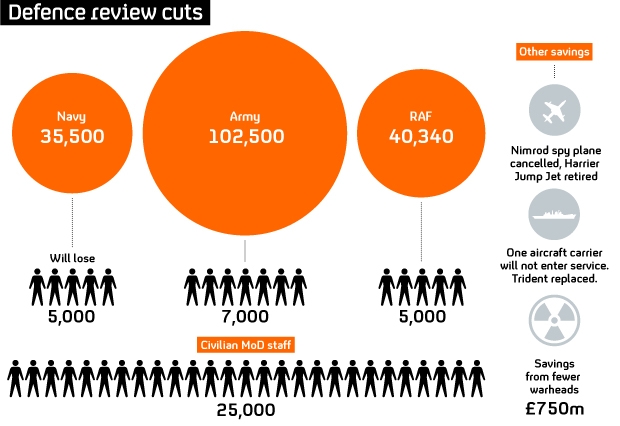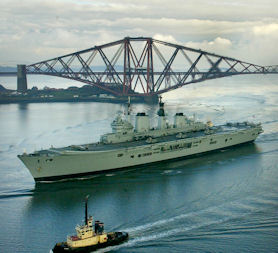Defence review: Armed Forces face 8 per cent cut
The Government announces an 8 per cent cut to the Defence Budget with almost 50,000 jobs being axed along with naval destroyers, Harrier jets and the Nimrod aircraft project.
David Cameron today insisted the government was protecting Britain’s future as he confirmed deep cuts to the Armed Forces.
The Prime Minister said the Ministry of Defence budget was facing cuts of 8 per cent by 2015 with army numbers dropping 7,000, navy personnel by 5,000 and the RAF also shedding 5,000. The MoD will have its civilian personnel cut by 25,000 by 2015.
Channel 4 News understands no infantry regiments will be scrapped from the army but the number of headquarters and logistics will come into focus.
“Britain has traditionally punched above its weight in the world and we should have no less ambition for our country in the years to come.” David Cameron
Nimrod
The Nimrod reconnaissance aircraft programme will also be cancelled and there will be fewer frigates and destroyers. Tanks and heavy artillery numbers will also be reduced by 40 per cent.
Announcing the Strategic Defence Review to the House of Commons today, the Prime Minister attacked Labour’s legacy saying the defence deficit had left a £38bn black-hole in future plans.
Mr Cameron said the defence strategy put forth the “right decisions, made in the right way, for the right reasons.”
After the reductions, the UK would still have the fourth largest military in the world, Mr Cameron told the Commons.
“Britain has traditionally punched above its weight in the world and we should have no less ambition for our country in the years to come,” he added.

‘Step change’
“This review sets out a step change in the way we protect this country’s security interests,” he added.
The Prime Minister stressed that the cuts would not affect operations in Afghanistan, which are funded from the Treasury’s special reserve rather than the MoD budget.
The Prime Minister said the decision on replacing Britain’s nuclear deterrent would not be taken until the next General Election. Instead, the life of the Vanguard class of submarines which carry the Trident system will be extended so that the final go-ahead for new submarines need not be given until “about 2016”.
Jet pilot challenges Cameron on cuts
The Prime Minister was today confronted by a Harrier jet pilot who told David Cameron he could end up jobless as a result of the defence cuts.
Lieutenant Commander Kris Ward, 37, who has flown dozens of combat missions in Afghanistan, tackled the Prime Minister about potential redundancies asking "How am I supposed to feel about that please, sir?"
The serviceman later said he feared cuts to the Armed Forces were the wrong ones.
Among the conclusions of the strategic defence and security review is that the Navy's flagship HMS Ark Royal and her fleet of Harrier jets will be scrapped with immediate effect.
Mr Cameron, who was touring the UK's operations headquarters, defended the need to make "difficult" decisions.
The PM thanked the serviceman for "everything" he had done for his country but insisted he had to "make decisions for the future" and that military chiefs backed the Harrier axe.
"I have listened to all the military advice, and the military advice is pretty clear that when we have to make difficult decisions, it is right to keep the Typhoon as our principal ground attack aircraft working in Afghanistan at the moment and it is right to retire the Harrier."

HMS Ark Royal cut
Aircraft carrier HMS Ark Royal is among the cuts to the Navy.
Without HMS Ark Royal Britain will be without an aircraft carrier capable of flying jets for up to a decade while two new vessels costing £5.2bn are being built and based in Portsmouth on completion. The carrier project has been spared the axe because it would cost the taxpayer more to scrap it.
The first aircraft carrier is expected to come into service in 2016, but it will need to be converted to allow it to be used by jets from allied nations and that could take several years.
Read the Strategic Defence and Security Review in full
Neither of the new carriers will be used by British military jets until at least 2020 and one could be mothballed and possibly sold under future options.
Defence Secretary Liam Fox insists the gap in Britain’s aircraft carrier capability will not affect its defence abilities. His reassurance comes despite warnings from Navy chiefs.
David Cameron reportedly told his Cabinet it was one of the hardest decisions he has made since becoming Prime Minister.
An intervention by David Cameron kept defence cuts at the Ministry of Defence to 8 per cent rather than the 10 per cent wanted by the Treasury as part of deficit-reduction efforts. He was advised by military chiefs it could affect the Afghanistan war and Washington expressed fears too.
Last night Cameron phoned US President Barack Obama to explain the strategy, assuring him Britain will remain a “first rate military power and a robust ally”, despite cuts to defence.
Rosyth aircraft carriers spared
Two aircraft carriers being built in Scotland will be spared from cuts to the defence budget.
Deputy Prime Minister Nick Clegg visited the Rosyth docklands where the carriers will be assembled to announce that the projects would go ahead. Joined by Scottish Secretary Michael Moore at the Fife dockyard he met workers to reassure them that their jobs were safe.
“The workers are delighted to have heard we have now confirmed that the two aircraft carriers will go ahead because that means their jobs and skills are being safeguarded for the future,” the Deputy Prime Minister said.
The Deputy Prime Minister also confirmed that the Government would be cancelling the Nimrod aircraft.
Local bases
He said that the decision would inevitably impact on the Moray communities dependent on RAF Kinloss and RAF Lossiemouth.
He said: “There’s clearly an impact of some of the decisions we’ve taken.
“Cancelling the Nimrod aircraft of course has a knock-on effect on the bases in Moray, but it’s not the end of the story.
“We’re not going to abandon the families and communities which are dependent for their jobs and their livelihoods on those bases.
“For instance, we’re looking at the possibility of redeploying military personnel from Germany to the UK and perhaps using the bases for that purpose in the future.”
National Crime Agency announced
The Government today confirmed the establishment of the National Crime Agency, which will incorporate the current Serious and Organised Crime Agency (SOCA) and Child Exploitation and Online Protection Centre (CEOP)
The Government will boost border security via a Border Police Command unit within the new NCA.
Britain's network of embassies will be maintained, but will take more responsibility for promoting British interests overseas "promoting our national security and prosperity".
There will be more emphasis on securing energy supplies, including focusing diplomatic efforts more in key supplier states such as Russia.
The new energy bill will pave the way for reducing UK's reliance on energy from overseas. It will remove "unnecessary obstacles" to investment in nuclear power such as planning barriers so that "energy companies can come forward to build nuclear power stations without public subsidy".




